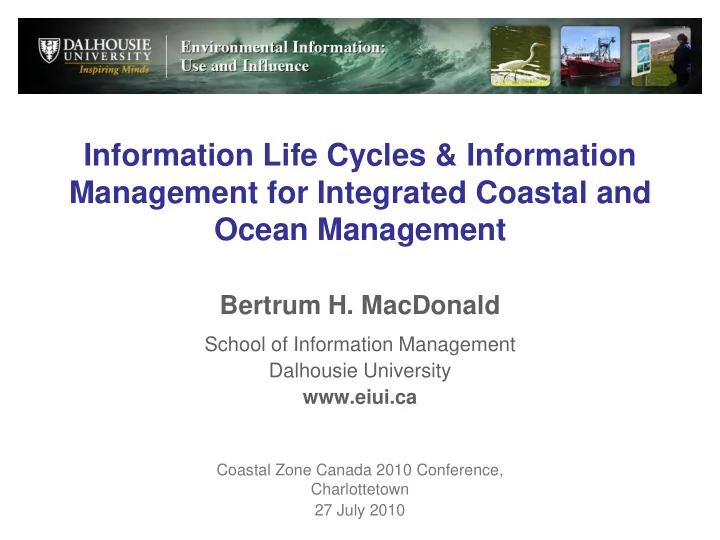

Information Life Cycles & Information Management for Integrated Coastal and Ocean Management Bertrum H. MacDonald School of Information Management Dalhousie University www.eiui.ca Coastal Zone Canada 2010 Conference, Charlottetown 27 July 2010
Why should there be interest in information management for ICOM? Is there a crisis in information management for ICOM? Why is information management “invisible” in ICOM? How can information management be more effectively used in ICOM?
Issue Identification & Assessment Program Preparation ICOM Evaluation Cycle Formal Adoption & Implementation Funding GESAMP. (1996). The contributions of science to coastal zone management. Reports and Studies , no. 61
ILC Information ICOM Life ILC ILC Cycle Cycle ILC
Production Distribution Use
Production Distribution Use Highly collaborative “… then there was lots and lots and lots of input from lots of people…who helped to provide content…that’s true of almost all of the publications that I’ve been familiar with …” (Working Group Member D). Inefficient “I must admit I’m not completed convinced that all the mechanisms that we’re trying to use …are working the way they should” (Working Group Member M). Inconsistent “I would say like most organizations it’s serendipity. It is the individual who helps put a report together, thinks of ways to disseminate it, in creative ways in ways that might be responsive to the target audience.” (Working Group Member L).
Production Distribution Use Informal process encourages creative distribution “I put together email lists of colleagues by interest or geographic area. So if I were told that a new publication came out on say shellfish contamination I would have a group of people that I would send that out to…” (Working Group Member Q). “I’m an aggressive forwarder ” (Working Group Member I).
Production Distribution Use “…normally it’s just off [the publication] goes, it could have been deleted, it could have been read, it could have been valued, I don’t know … we all push a lot of information out there and hope it … sticks or its relevant or used” (Working Group Member I). “… we have a five or six page handout on [the] American Eel … and its status in the Gulf of Maine. So, I gave that to our pelagics advisor and he found it very informative … now he never told me like that changed how [he] recommended to the minister what our position is on it …” (Working Group Member K).
Grey literature has fundamental value in marine environmental contexts Through 4 case studies – in progress – we are unpacking the significant stages of information lifecycles to reach understanding of use and influence of information This understanding is important for organizations for: • Accountability & Funding • Credibility & Trust • Awareness / access to information
Ocean governance and management may be (is?) failing because… We are not using information effectively
Recommend
More recommend